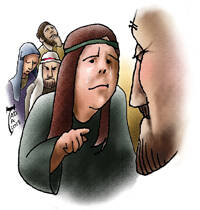Being There
One thing you want to be able to depend upon is that your loved ones will be with you in time of need. Therefore, the most puzzling part of today’s Gospel is that Jesus does not go right away to be with his dear friend Lazarus and his sisters after he receives word of Lazarus’s illness. Why does he delay? The text does not answer that question directly. Even after Martha says to him forthrightly, “If you had been here my brother would not have died,” Jesus does not explain why he stayed away for two more days before deciding to come to Bethany. Mary confronts Jesus with the very same complaint (v. 32). Later, the onlookers ask, “Could not the one who opened the eyes of the blind man have done something so that this man would not have died?” (v. 37). The troubling question, voiced three times, is: Where is Jesus when you need him?
It adds to the puzzlement that at other times in the Gospel of John Jesus does come to the aid of persons in need of healing: the royal official’s son in Capernaum (4:46-54), a man who was paralyzed at the pool of Bethesda (5:1-18) and a man born blind (9:1-41) near the pool of Siloam. In each of these instances there appears to have been no prior relationship between Jesus and the one asking for healing. Jesus is simply passing by when he sees the man born blind (9:1). The man healed at Bethesda does not know who Jesus is (5:11, 13). In the case of the royal official, Jesus refers to him as part of “you people,” whom he disparages because of their desire for signs and wonders (4:48). Why would Jesus extend himself to these people and not to his own close friends? He had once even put himself in danger by doing so in Bethesda, and that episode concludes with Jesus’ opponents trying to kill him (5:18).
The two days Jesus delayed in going to Bethany may have been time that he needed to discern whether it was “the hour” for him to take this fatal step. It is clear that to go to Judea would put Jesus at great risk. His disciples twice try to dissuade him from going there (11:7-8, 12). Thomas’s wry remark, “Let us also go, that we may die with him” (11:16), proves to be exactly true; the chapter ends with the Sanhedrin planning to put Jesus to death (11:53).
As Jesus’ followers try to build communities of equal disciples, it is a challenge to embrace as friends those who are not kin and those to whom we are not naturally drawn. It is even more difficult to be willing to lay down one’s life for any of those befriended, as Jesus does. In the fourth Gospel, Jesus’ mission is to bring life to the full for all (10:10) by offering friendship to all persons and drawing them to himself (12:32). Jesus loves Martha, Mary and Lazarus (vv. 3, 5, 35). But he also loves all other persons—to the death. There are no favorites or best friends. The anonymous Beloved Disciple stands for each person who allows himself or herself to be loved by Jesus and to love him in return. All of us, beloved of Jesus, can put ourselves in the place of the one who rests on Jesus’ bosom (13:23).
When one chooses to abide in Jesus, then he is always present, even if not in the same physical, earthly way the first beloved disciples wanted him to be. As Martha professes her belief in the Risen One, she affirms that he is always truly present and that all who die believing in him are likewise living and present still. Such belief does not take away grief for the dear departed but turns our mourning into hope-filled joy.
This article also appeared in print, under the headline “Being There,” in the April 4, 2011, issue.








